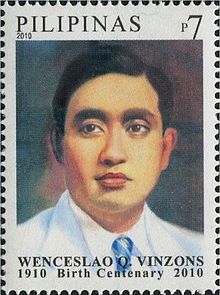Wenceslao Vinzons
| Wenceslao Vinzons | |
|---|---|

Vinzons on a 2010 stamp of the Philippines
|
|
| Member of the Philippine House of Representatives from Camarines Norte's Lone District | |
|
In office December 30, 1941 – July 15, 1942 |
|
| Preceded by | Trinidad P. Zenarosa |
| Succeeded by |
Vacant Post later held by Esmeraldo Eco |
| Governor of Camarines Norte | |
|
In office 1940 – December 30, 1941 |
|
| Member of the 1934 Philippine Constitutional Convention from Camarines Norte | |
|
In office 1934–1935 |
|
| Personal details | |
| Born |
September 28, 1910 Indan, Camarines Norte, Philippine Islands |
| Died | July 15, 1942 (aged 31) Daet, Camarines Norte, Commonwealth of the Philippines |
| Profession | Lawyer |
Wenceslao Quinito Vinzons (September 28, 1910 – July 15, 1942) was a Filipino politician and a leader of the armed resistance against the Japanese occupying forces during World War II. He was the youngest member of the 1935 Constitutional Convention. Among the first Filipinos to organize the guerrilla resistance after the Japanese invasion of the Philippines in 1941, he was executed by the Japanese Army.
Vinzons was born in the town of Indan, Camarines Norte to Gabino Vinzons y Venida and Engracia Quinito y Elep. He graduated valedictorian from his local high school, and proceeded to Manila to study at the University of the Philippines.
While at the university, Vinzons gained fame as a student leader. A member of Upsilon Sigma Phi, Vinzons would be elected president of the student council and editor-in-chief of the Philippine Collegian. He was also known for delivering an oratorical address entitled Malaysia Irredenta, where he advocated the unification of Southeast Asian nations with a common Malay origin. The piece won him the Manuel L. Quezon gold medal for excellence.
Vinzons obtained his law degree from the University of the Philippines College of Law in 1932, and placed 3rd in the bar examinations of the following year.
After graduation, Vinzons, along with Narciso J. Alegre and Arturo M. Tolentino (a future senator and Marcos-era vice-president) founded a political party, the Young Philippines Party, which advocated the grant of Philippine independence from American rule. After the passage in 1934 of the Tydings–McDuffie Act which laid the groundwork for independence, Vinzons successfully sought election that same year as a delegate representing Camarines Norte to the 1935 Constitutional Convention tasked with drafting a new constitution. As a member of the Convention, he was instrumental in prescribing Tagalog as an official language of the Philippines. At 24, he was the youngest delegate, and the youngest signer of the 1935 Constitution.
...
Wikipedia
